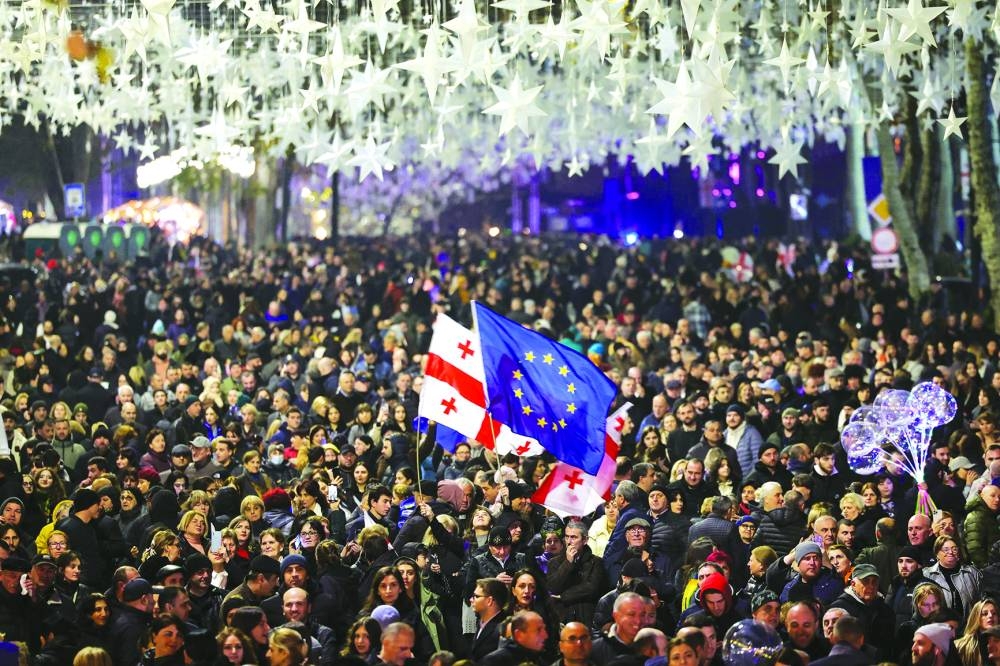Hungarian Prime Minister Viktor Orban vetoed a big European Union aid package for Kyiv yesterday, and said he could still halt Ukraine’s accession after EU leaders approved the start of lengthy membership talks.
Leaders of all 27 EU states except Hungary agreed at a summit on Thursday to start accession talks with Ukraine despite Russia’s invasion of its neighbour, bypassing Orban’s grievances by getting him to leave the room.
However, they could not overcome resistance from Orban to a revamp of the EU budget to channel €50bn ($55bn) to Ukraine and provide more cash for other tasks such as managing migration.
EU leaders said they would continue to help Kyiv.
European Commission chief Ursula von der Leyen vowed that her executive would use the time to ensure there is a “operational solution” to Orban’s veto “whatever happens”.
That could mean the other 26 EU countries that back giving the aid to Kyiv could club together without Hungary to come up with the aid outside the bloc’s budget.
“We are working very hard, of course to have a result where there is an agreement of 27 member states,” von der Leyen said. “But I think it is now also necessary to work on potential alternatives.”
Irish Prime Minister Leo Varadkar said that “it looks like we’ll just have to regroup next year, and come to an agreement then, or do a workaround.”
Orban, who has a history of trying to use disagreements with other EU leaders for his electoral benefit, told state radio that he had blocked the aid package – part of a broader multi-year EU budget plan – to ensure Budapest gets funds from the EU budget that are frozen over concerns about the rule of law in Hungary.
“It is a great opportunity for Hungary to make it clear that it must get what it is entitled to. Not half of it, or one-fourth,” he said.
The European Commission, the EU executive, restored Hungary’s access to €10.2bn of frozen funds on Wednesday after Budapest passed laws addressing some of the EU’s concerns, but funds worth billions of euros remain frozen.
Ukrainian President Volodymyr Zelensky hailed the approval of membership talks as a victory for Ukraine and Europe.
Kyiv is reliant on foreign assistance as Russia’s war in Ukraine rages on, and US President Joe Biden has so far been unable to get a $60bn package for Kyiv through Congress.
Lithuanian President Gitanas Nauseda said the decision to start accession talks made him “proud to be European” but was “only the first page of a very long, long process”.
Orban said Hungary could still block the talks at any time.
“This is a bad decision,” he said. “We can halt this process later on, and if needed we will pull the brakes.”
The EU leaders ended talks on the financial package in the early hours of yesterday.
All except Orban agreed to provide Ukraine with €50bn over four years, but his veto blocked the funds because the decision requires unanimity.
“I can assure you, Ukraine will not be left without support, there are different ways to do this,” Estonian Prime Minister Kaja Kallas said, suggesting that a solution could be found by January, when an extraordinary summit would be held.
The best legal form for providing aid outside the EU budget is yet to be determined, but the European Commission could co-ordinate the collection of grants promised under the agreement and pass it on to Kyiv.
If the money were to be provided as loans, EU governments would probably need to provide guarantees for their part of the borrowing, a more cumbersome and costly process that might have to be repeated each year as new national budgets are passed.
Ukraine is unlikely to join the EU for many years, but the decision at the Brussels summit took it a step closer to its long-term strategic goal of anchoring itself in the West and leaving Russia’s orbit.
German Chancellor Olaf Scholz played a big role in getting Orban to leave the room to clear the way for a decision, diplomats and officials said.
EU leaders reconvened yesterday to discuss other topics including the Israel-Hamas war.
The Kremlin has praised the stance taken by Orban.
Kremlin spokesman Dmitry Peskov said that Budapest “in contrast to many European countries, firmly defends its interests, which impresses us”.
However, Moscow was far more critical of the decision by the EU to open accession talks with Ukraine and fellow ex-Soviet state Moldova, and make Georgia a formal candidate to join.
“This is absolutely a politicised decision – the EU’s desire to show support to these countries in this way. But certainly, such new members can actually destabilise the EU,” Peskov said. “Everything is being done to annoy Russia and antagonise these countries towards Russia.”

TOPSHOT - Georgians rally to celebrate the country's European Union candidate status in Tbilisi on December 15, 2023. (Photo by Giorgi ARJEVANIDZE / AFP)
